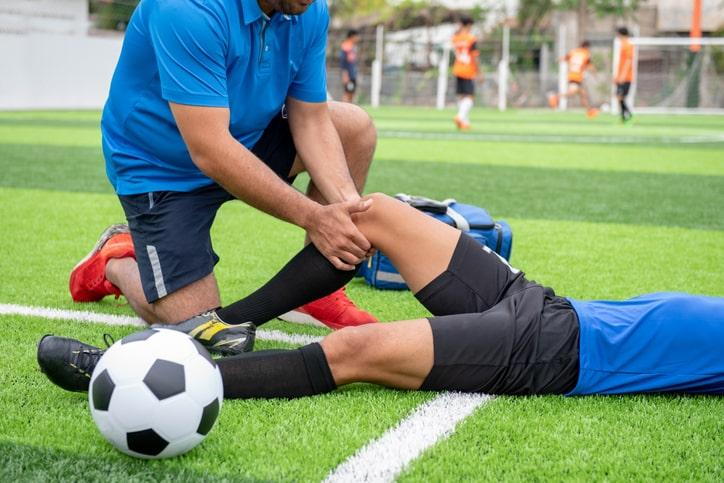
In the world of sports, injuries are an unfortunate but inevitable part of the game. Whether you're a professional athlete or a weekend warrior, the physical toll of an injury can be immense. However, what often goes overlooked is the psychological impact of injury recovery. The mental and emotional challenges that accompany physical rehabilitation can be just as demanding, if not more so, than the physical aspects. In this blog post, we will delve into the psychology of injury recovery in sports, exploring the emotional stages athletes go through, the mental strategies that can aid in recovery, and the importance of psychological support.
The Emotional Stages of Injury Recovery
Injury recovery is not just a physical journey; it is also an emotional one. Athletes often go through a series of emotional stages as they cope with their injury and work towards recovery. Understanding these stages can help athletes and their support systems better navigate the psychological challenges of injury recovery.
- Shock and Denial: The initial reaction to an injury is often shock and denial. Athletes may struggle to accept the reality of their situation and may downplay the severity of their injury. This stage can be characterized by disbelief and a refusal to acknowledge the need for rest and rehabilitation.
- Anger and Frustration: As the reality of the injury sets in, athletes may experience anger and frustration. They may feel angry at themselves, their circumstances, or even their medical team. This stage can be marked by feelings of helplessness and a sense of injustice.
- Depression and Isolation: The loss of the ability to participate in their sport can lead to feelings of depression and isolation. Athletes may withdraw from social activities and feel a sense of loss and sadness. This stage can be particularly challenging as it can impact motivation and adherence to rehabilitation protocols.
- Acceptance and Adaptation: Over time, athletes may come to accept their injury and begin to adapt to their new reality. This stage is characterized by a more positive outlook and a willingness to engage in the rehabilitation process. Athletes may start to set new goals and focus on what they can control.
- Reintegration and Confidence Building: As athletes progress in their recovery, they begin to reintegrate into their sport and build confidence in their abilities. This stage involves overcoming fears of re-injury and regaining trust in their body. It is a critical phase for mental and emotional resilience.
Mental Strategies for Injury Recovery
The psychological aspect of injury recovery is crucial for a successful return to sport. Here are some mental strategies that can aid in the recovery process:
- Goal Setting: Setting realistic and achievable goals can provide a sense of direction and purpose during recovery. Short-term goals can help athletes stay motivated and focused on their progress, while long-term goals can provide a vision for the future.
- Positive Visualization: Visualization techniques can help athletes mentally rehearse their recovery and return to sport. Imagining successful rehabilitation and a triumphant return to competition can boost confidence and reduce anxiety.
- Mindfulness and Relaxation: Mindfulness practices, such as meditation and deep breathing exercises, can help athletes manage stress and stay present in the moment. Relaxation techniques can also aid in pain management and improve overall well-being.
- Cognitive Restructuring: Cognitive restructuring involves challenging and changing negative thought patterns. Athletes can work with a sports psychologist to identify irrational beliefs and replace them with more positive and realistic thoughts.
- Social Support: Maintaining connections with teammates, coaches, friends, and family is essential for emotional support. Social interactions can provide encouragement, reduce feelings of isolation, and foster a sense of belonging.
- Professional Help: Seeking the help of a sports psychologist or counselor can provide valuable support and guidance. These professionals can offer tailored strategies to address the unique psychological challenges of injury recovery.
The Importance of Psychological Support
The psychological aspect of injury recovery is often underestimated, but it plays a critical role in an athlete's overall rehabilitation. Psychological support can help athletes navigate the emotional stages of recovery, maintain motivation, and build resilience. Here are some key reasons why psychological support is important:
- Enhanced Coping Skills: Psychological support can equip athletes with effective coping strategies to manage the emotional challenges of injury recovery. This can lead to better adherence to rehabilitation protocols and a more positive outlook.
- Improved Mental Health: Addressing the psychological impact of injury can prevent the development of mental health issues such as depression and anxiety. Early intervention and support can promote overall mental well-being.
- Faster Recovery: A positive mindset and strong psychological support can contribute to a faster and more successful recovery. Athletes who are mentally resilient are more likely to stay motivated and committed to their rehabilitation.
- Reduced Risk of Re-Injury: Psychological support can help athletes build confidence and reduce the fear of re-injury. This can lead to a safer and more effective return to sport.
- Holistic Approach: Integrating psychological support into injury recovery provides a holistic approach that addresses both the physical and mental aspects of rehabilitation. This comprehensive approach can lead to better outcomes and long-term success.
Injury recovery in sports is a multifaceted process that involves both physical and psychological components. Understanding the emotional stages of recovery, utilizing mental strategies, and seeking psychological support can significantly enhance an athlete's rehabilitation journey. By addressing the psychological impact of injury, athletes can build resilience, maintain motivation, and achieve a successful return to their sport. Remember, injury recovery is not just about healing the body; it's also about nurturing the mind. If you need help with psychological rehabilitation, call me at (404) 341-5682. Let’s talk soon!